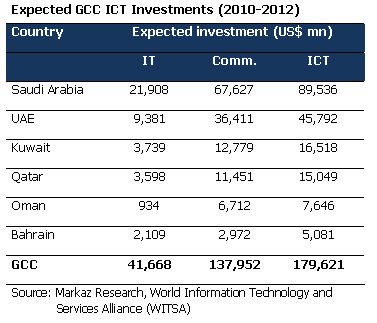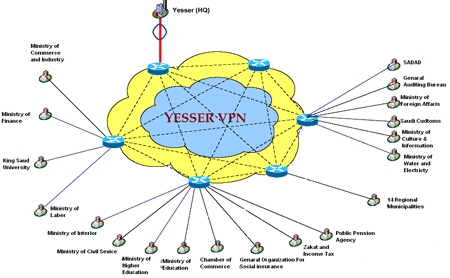Network Economy
ICT Employment Opportunities (Stage 3)
At the end of 2009, the Saudi Arabia unemployment rate was approximately 11.7% and was ranked as the 128th lowest rate in the world; current rankings meaning it’s a high rate.
The high unemployment rate however is due to a couple of factors: the lack of local ICT training and skills necessary to meet the demand of the booming ICT economy/job market, as well as the availability of jobs. Current highly skilled jobs rely on the employment of expatriate workers (80%). So, in an attempt to reverse this trend, the Saudi Ministry of Labor recently unveiled plans to reduce the number of work visas issues yearly to non-citizens, while investing in training of Saudi nationals for various types of jobs (including ICT jobs), it will also reward private companies for hiring locals. Furthermore, the Saudi Government has accelerated the overhaul of its education system by increasing budgetary allocations for education and manpower development projects, as well as intensifying collaboration with international universities, institutions and major corporations. In its 2010 Education budget, the Saudi Government allocated $36.5 billion, an increase of 25% from the previous year (2009).

The Kingdom of Saudi Arabia is the Gulf's largest information and communications technology (ICT) market and is expected to make up about 50 per cent of ICT investments in the region through 2012, according to the "GCC ICT Infrastructure Report" from Kuwait Financial Centre released Jan of 2010. An estimated $90 billion is expected to be allocated for ICT-related infrastructure projects In Saudi alone within the next three years, which will make it a major employment generator, above and beyond of where it is today.
The booming ICT sector has been coming for a long time though. The strategic creation of the Saudi Arabian General Investment Authority (SAGIA), in 2000, over the years has smoothly streamlined processes to attract investors. SAGIA is responsible for promoting investment opportunities in the Kingdom, by providing a number of services such as licensing, support services (i.e. area info, stats, reports) to investors, as well as looking for business opportunities and matching them with appropriate investors. The biggest current project of SAIGA is to govern the Six “Economic” Cities project. The development of the “Economic” Cities will offer investors, both domestic and international, an unparalleled, business-friendly environment within a globally competitive regulatory and incentive-offering framework. Investments in real estate, manufacturing, IT, financial services, retail and tourism are increasing. The objectives of the Economic Cities are to: Promote balanced regional development, Achieve economic diversification, Create jobs and enhance competitiveness in Saudi Arabia. Currently a number of big transnational corporations are already investing in the project, companies such as Microsoft, Cisco, Sun Microsystems, General Electric and Dell.
Business-to-Consumer (B2C) Electronic Commerce (Stage 3)
E-Business to Consumer is a growing medium in Saudi Arabia. The Sadad system is the official e-commerce system. According to a 2008 Arab Advisors Group major survey of Internet users in Saudi Arabia revealed a high adoption of e-commerce in the booming Saudi Arabian economy. Findings showed that 48.36% of Internet users in Saudi Arabia purchased products and services online and/or through their mobile handsets in 2007. According to the report, the total volume of online transactions was nearly $3.28 billion in 2007. Currently, the Sadad system is being used to process 82% of all bills paid in Saudi Arabia.
Based on the findings the Arab Advisors Group estimates e-commerce users in Saudi Arabia exceed 3.5 million consumers and represent roughly 14.26% of the population. The survey covered Internet users and usage, as well as reasons why other members of the same households surveyed do not use the Internet. Based on the feedback of Internet users the most common answers where computer illiteracy, lack of interest, lack of a perceived need to use the Internet and being too young to use the Internet(http://www.ameinfo.com/143272.html )
According to the survey the B2C E-commerce offers plenty of opportunities to the regional and global E-commerce players to tap in this growing segment. Rapidly growing economy and growing number of Internet users are the key factors to make E-commerce successful in Saudi Arabia. It was also revealed that different government departments in the country are accepting E-systems to automate their day-to-day operations. The quick growth in the electronic payment method is complementing E-commerce in the country.
Business-to-Business (B2B) Electronic Commerce (Stage 3)
There are a number of B2B e-marketplaces in Saudi Arabia, such as Gulf Business, Saudi Commerce, and wholesalers network just to name a few. However, the biggest and most notable B2B e-marketplace in Saudi Arabia is Tejari Saudi Arabia (Tejari SA). Tejari SA was established in November 7, 2007 with a vision to become the leading business-to-business (B2B) electronic Marketplace in Saudi Arabia. (Source: http://www.ameinfo.com/72939.html)
Tejari SA’s mission is to maximize the business potential of their customers in the Kingdom of Saudi Arabia by providing them with innovative electronic B2B services, enabling them to extend their reach and enhance their competitive standing.
Tejari is the leading electronic procurement service provider in the region due to its demonstrated knowledge of the unique culture, challenges and traditions of the region’s business community. The Tejari franchise was started by the Dubai Corporate Group in 2000 to provide B2B in the UAE, since then it’s grown to 12 countries, it’s the only platform to support the Arabic language and in the process has become the region’s (Middle East, Africa and West Asia’s) premiere business-to-business (B2B) electronic marketplace. (Source: http://www.ameinfo.com/138345.html)
Tejari SA’s greatest strength is derived from its thorough experience of the local business environment, its excellent IT support (Oracle based ERP system), and its extensive financial backing. Saudi Telecom Company (STC) - the largest Saudi telecom service provider in SA holds 50% of Tejari SA shares, Technology Investment Company hold 40% of shares and the rest are held by National Information Systems Company, the company that developed the system.
E-Government (Stage 3 as of Aug. 2010, Stage 4 by end of 2010)
Currently there are some electronic government offerings online but certainly not enough.
“Homoud Al-Fayez the chair of the committee indicated that only 23 % is offering electronic facilities at the present and that three billion Saudi Riyals ($800 million) is granted by the Saudi government to meet the completion of the electronic government and ending the era of bureaucracy.” (http://www.ameinfo.com/133424.html)
As technology advances and grows, it’s really imperative that governments/companies all over the world exploit available technology to provide their citizens/consumers with the best possible services. There are many benefits to the evolution of technology, just about everyone recognizes that and the Saudi Arabian government is no exception. Furthermore, as a WTO member, it’s a KSA obligation to provide e-government services. With this in mind, the Kingdom of SA is striving to complete an e-government program (Yesser) that will provide its public services in a standardized electronic website as early as Dec. 2010.
The programs vision statement reads:
"By the end of 2010, everyone in the kingdom will be able to enjoy – from anywhere and at anytime – world class government services offered in a seamless, user friendly and secure way by utilizing a variety of electronic means". (http://www.yesser.gov.sa/english/default.asp) The
following table shows a list of some of the government agencies included in the plan of networking (Source: yesser.gov website).


The following figure shows the diagram of SA Government Secure Network (GSN) (source: yesser.gov website).

In summary this E-Government program will basically allow users (general public, businesses and governments) to completely deal electronically with the government (G2C, G2B and G2G) in a seamless secure manner. The following are specific objectives of the project: raise the productivity and efficiency of the public sector; provide better and more easy-to-use services for individual and business customers: increase return on investment (ROI); and provide the required information in a timely and highly accurate fashion.

